India abstains to defend Sri Lanka at UNHRC, Tamil nationalists expose stance
![On 23 March, despite India’s abstention from voting on the UNHRC resolution on accountability of Sri Lanka for its gross human rights abuse of Eelam Tamil rights, the resolution was adopted in a deep embarrassment to Sri Lanka. Chennai-based Tamil National Movement President Periyasamy Maniarasan in a scathing review exposes the guise of India’s neutrality in its abstention from voting. He debunks the skewed twist of India and other countries relating human rights compliance to the sovereignty question even when […]](https://www.theworldsikhnews.com/wp-content/uploads/2021/03/Sri-Lanka-Bombing-360x266.jpg)
On 23 March, despite India’s abstention from voting on the UNHRC resolution on accountability of Sri Lanka for its gross human rights abuse of Eelam Tamil rights, the resolution was adopted in a deep embarrassment to Sri Lanka. Chennai-based Tamil National Movement President Periyasamy Maniarasan in a scathing review exposes the guise of India’s neutrality in its abstention from voting. He debunks the skewed twist of India and other countries relating human rights compliance to the sovereignty question even when the resolution reaffirms “commitment to the sovereignty, independence, unity and territorial integrity of Sri Lanka.” WSN editor Jagmohan Singh examines the historical resolution, its context and its possible impact on Sri Lanka, South Asia and the Tamil world.
When cornered, India knows how to play its game. With international human rights bodies and India’s civil liberties groups and political bodies and activists citing international data and reports, India is feeling the heat. Sri Lanka’s Sinhalese leadership, practising its own brand of violent Buddhism have no remorse for gross wrongs, no mercy for the beleaguered Eelam Tamils, no respect for international opprobrium nor concern for human rights conventions and treaties. Expectedly, Sri Lanka rejected the 23 March UNHRC resolution as “politically motivated”. Earlier too, the Sri Lankan Government had officially withdrawn from the co-sponsorship of HRC Resolutions 30/1, 34/1 and 40/1 and walked away from HRC’s accountability process.

When the genocide of the Eelam Tamils was on in Sri Lanka, many countries of the world, including India either turned a blind eye or connived with the guilty country. As part of the abstention argument, India pays lip service to the aspiration of Tamils in Sri Lanka and ostensibly upholds their yearning for equality, justice and peace but all of this is sacrificed at the altar of supporting the territorial integrity of Sri Lanka perpetrating genocide,” says Tamil National Movement leader and Tamil ideologue Periyasamy Maniarasan, in a hard-hitting statement amidst the ongoing electioneering in the Tamil-dominated Tamil Nadu state of India.
India is very clever at obfuscating facts and context. The UNHRC vote was about human rights violations of democratic principles, accountability of the missing hundreds of thousands of Tamils -Thamizh people who were killed extrajudicially, yet India and other naysayers continue to harp on “unity of Sri Lanka” and “non-interference in internal affairs.”
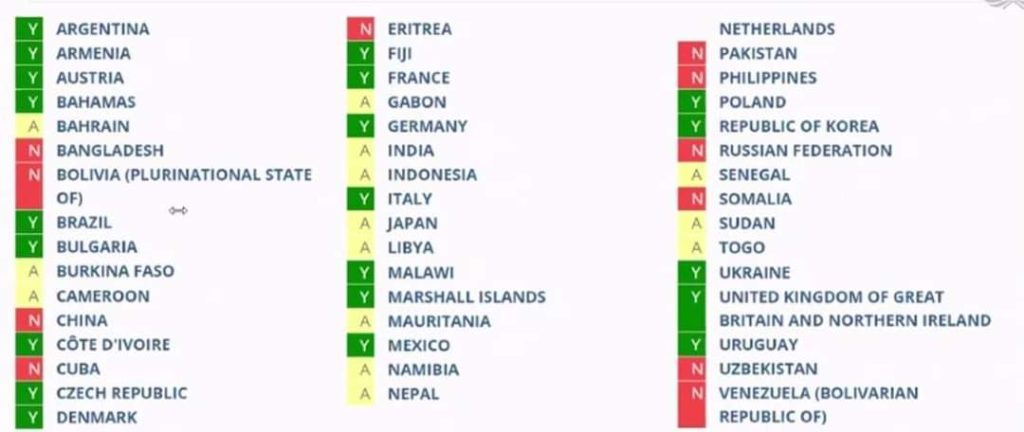
TNM chief Periyasamy Maniarasan in his video message has called upon fellow Tamils to read between the lines. He says, “Make no mistake. Even if the Indian National Congress were to be in power, they too would have done the same thing. India is not concerned, because those who die are Tamizhs.” He cites the case of the seven accused in the Rajiv Gandhi case and how both the Congress party and the BJP have stalled their release from prison even after they have completed their full sentences.
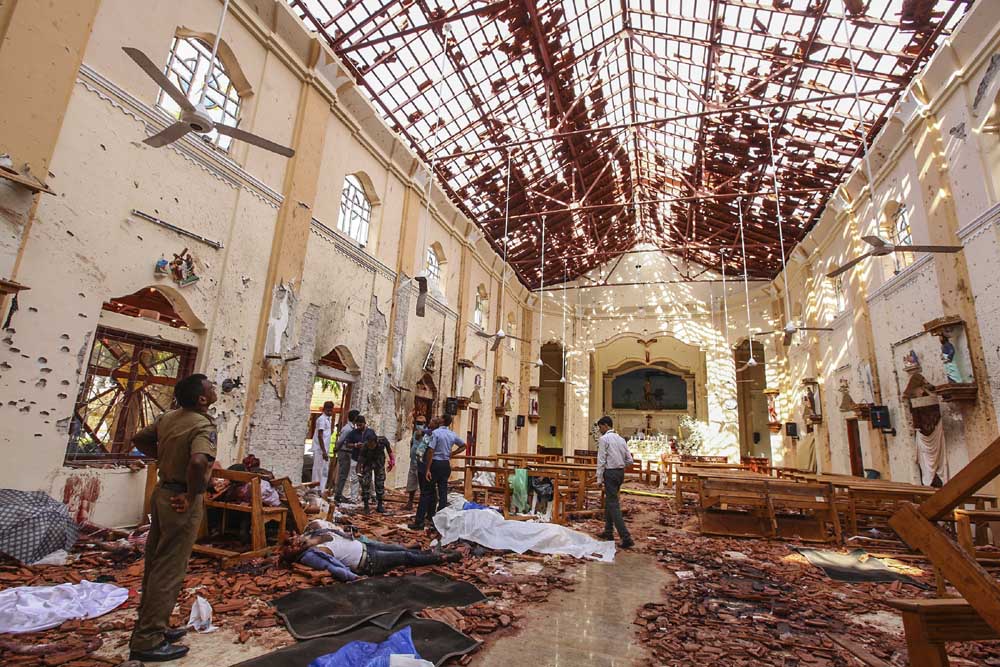
The United Nations Human Rights Council resolution on ‘Promoting reconciliation, accountability and human rights in Sri Lanka’ was adopted after 22 member states of the 47-member Council voted in its favour.
The dogged persuasion of UNHRC chief Michelle Bachelet has won the mandate for collecting evidence of crimes against humanity targeting civilian Tamils by indiscriminate aerial bombardments on hospitals, involuntary disappearance of poor Tamils in the countryside and extrajudicial killings of rebels, particularly those who were forced to surrender. All of this was while fighting the war against Eelam Tamil Tigers.
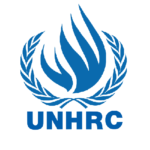
Tamil National Movement commended the introductory remarks of UNHRC chief Bachelet, who while introducing the Sri Lanka Accountability Resolution had said, “the effect of the conflict on thousands of survivors from all communities was devastating. Despite commitments made in 2015, the current government, like its predecessor, has failed to pursue genuine truth-seeking or accountability processes …the systems, structures, policies and personnel that gave rise to such grave violations in the past remain – and have recently been reinforced.”

The current UNHRC resolution, which will impact the international position of Sri Lanka and with timely and effective implementation is likely to influence the geopolitical situation in South Asia, is based on the purposes and principles of the Charter of the United Nations and the International Covenants on Human Rights and other relevant instruments. It has also documented that there have been Human Rights Council resolutions, namely 19/2 of 22 March 2012, 22/1 of 21 March 2013, 25/1 of 27 March 2014, 30/1 of 1 October 2015, 34/1 of 23 March 2017 and 40/1 of 21 March 2019.
The resolution S-11/1 of 27 May 2009 stated that “the Human Rights Council welcomed the resolve of Sri Lanka to begin a broader dialogue with all parties in order to seek a political settlement and to bring about lasting peace and development in Sri Lanka based on consensus among and respect for the rights of those from all ethnic and religious groups, and endorsed the joint communiqué of 26 May 2009 of the President of Sri Lanka and the Secretary-General, in which the Secretary-General, inter alia, underlined the importance of an accountability process for addressing violations of international humanitarian law and human rights law.”
🇱🇰 #SriLanka: Long-standing, structural and systemic issues persist, and now there are clear warning signs that past patterns of violations could be repeated. – UN Human Rights Chief @mbachelet tells @UN_HRC.
Read more: https://t.co/IGDRAEWXgd#StandUp4HumanRights #HRC46 pic.twitter.com/BETjt22HQ4
— UN Human Rights (@UNHumanRights) February 24, 2021
Significantly, the UNHRC has allocated $2.8 million for pursuing the 23 March 2021 resolution “to prosecute war criminals through an international evidence gathering and investigation mechanism.” The UNHRC resolution allows the UN “to collect, consolidate, analyse and preserve information and evidence, and to develop possible strategies for future accountability processes for gross violations of human rights or serious violations of international humanitarian law in Sri Lanka, to advocate for victims and survivors, and to support relevant judicial and other proceedings”.
The UNHRC has allocated $2.8 million for pursuing the 23 March 2021 resolution “to prosecute war criminals through an international evidence gathering and investigation mechanism.”
Sri Lanka has said that it will not allow any such activity as it is without its concurrence. Human Rights observers feel that even after the passing of the resolution, it will take some months before UNHRC can take the first effective steps towards its implementation.
Sri Lanka thanked India for abstention, increasing its bargaining position over the country and also influencing a section of the Tamil Diaspora that seems satisfied with India’s stance. The “China block” consisting of China, Pakistan and Bangladesh opposed the resolution, with Nepal abstaining. European nations proposed and assented to the resolution. Many South American and African countries too supported.
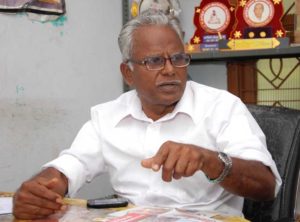
Maniarasan has specifically pointed out in his video essay that communist countries like Cuba and Venezuela, who pretend to be pro-people, also opposed the UNHRC resolution. He said, “It is patently clear that Communism is against the natural liberation of distinct races.” He argues that realpolitik is about economics, population numbers and interests; the world population of Tamils may be a sizable number but minuscule in Sri Lanka.
“Tamils are political orphans without a nation. We have no choice but to become a sovereign nation. We need a people’s movement for our homeland. We are enslaved in Tamizhnaadu but do not realise it. The electoral process has undermined our sovereignty and proved useless in the deliverance of civil and political rights.”
 In June 2010, the then U.N. Secretary-General Ban Ki-Moon formed a Panel of Experts with a mandate to advise him on accountability options for the human rights violations committed “during the final stages” of the civil war in Sri Lanka and this panel presented its final report in April 2011, which was rejected by the Sri Lankan government. “The Panel of Experts [on Accountability in Sri Lanka] stated that “[a] number of credible sources have estimated that there could have been as many as 40,000 civilian deaths”. Many Tamil humanitarian and human rights bodies have posted the number to be three times this number.
In June 2010, the then U.N. Secretary-General Ban Ki-Moon formed a Panel of Experts with a mandate to advise him on accountability options for the human rights violations committed “during the final stages” of the civil war in Sri Lanka and this panel presented its final report in April 2011, which was rejected by the Sri Lankan government. “The Panel of Experts [on Accountability in Sri Lanka] stated that “[a] number of credible sources have estimated that there could have been as many as 40,000 civilian deaths”. Many Tamil humanitarian and human rights bodies have posted the number to be three times this number.
This resolution has brought to the fore the importance of Diaspora groups and an appreciation of their relentless lobbying work. The persistence of the Tamil Diaspora groups and the brave outspokenness of stalwart British and European Members of Parliament has so far ensured that the world community does not forget this crime against humanity. Since the end of the Eelam Tamils-Sri Lanka war, Tamil nationalists have kept afloat the flag of Tamil nationalism in Sri Lanka and elsewhere for the 74 million strong Tamils in the world.
Noteworthy is the fact that, though the current resolution reaffirms the territorial integrity of Sri Lanka, it also calls upon “the Government of Sri Lanka to fulfil its commitments on the devolution of political authority, which is integral to reconciliation and the full enjoyment of human rights by all members of its population.”
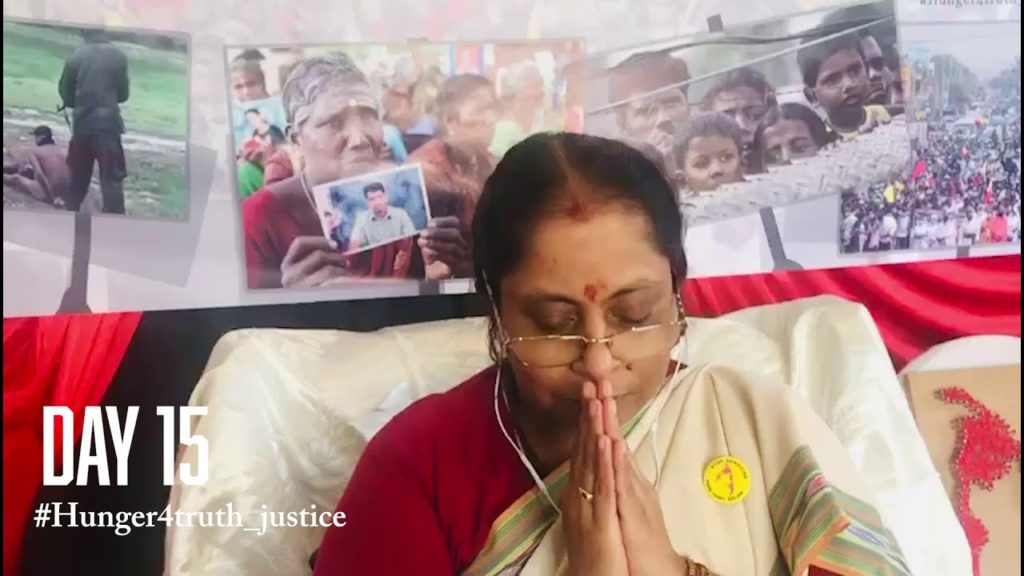 There has been no let-up, even till today, of Buddhist Sinhalese atrocities on Tamils in Sri Lanka. Days prior to the adoption of this historic UNHRC resolution, Sri Lankan human rights activist and veteran British civil servant Ms Amibhai Selvakumar was on a fast unto death since 27 February 2021, seeking effective UN resolutions and intervention. She must be a little relieved at the passing of the UNHRC resolution.
There has been no let-up, even till today, of Buddhist Sinhalese atrocities on Tamils in Sri Lanka. Days prior to the adoption of this historic UNHRC resolution, Sri Lankan human rights activist and veteran British civil servant Ms Amibhai Selvakumar was on a fast unto death since 27 February 2021, seeking effective UN resolutions and intervention. She must be a little relieved at the passing of the UNHRC resolution.
During the hunger strike, In her statement to the media, Ms Selvakumar had appealed to the British government and the fair sense of the international community to look into “the staggering Sinhalisation of Tamil lands, destruction of commemoration monuments, obstruction of equality and the elimination of the Tamil language and history are merely a few examples of the ongoing genocide.”
She also pointed out that ever since the end of the war in 2009, to date, “Sri Lanka’s domestic processes have persistently and manifestly failed thousands of victims and their families, which has further fuelled the demand for an international inquiry by the United Nations.”
Currently, while electioneering continues in the Indian state of Tamil Nadu, in an unprecedented act of solidarity, on 15 January 2021, all major Tamil political leaders, Tamil civil society actors and Tamil victim community representatives from the North-East of Sri Lanka had signed a statement calling for an international accountability process, including a referral to the International Criminal Court (ICC) to hear the charges of genocide, war crimes, and crimes against humanity.
I appeal to the good sense of the British and the international community to examine the staggering Sinhalisation of Tamil lands, destruction of commemoration monuments, obstruction of equality and the elimination of the Tamil language and history are merely a few examples of the ongoing genocide.”
Over 250 British Tamil organisations had also called upon the UK government to establish an International Independent Investigative Mechanism (IIIM) to investigate the war crimes and the charge of genocide in Sri Lanka. Furthermore, on 4th February 2021, a second Joint Request unitedly signed by more than 500 British organizations fully endorsed the above call.
The UN resolution has reaffirmed that “all measures taken to combat terrorism must fully comply with States’ obligations under international law, in particular international human rights law, and, as applicable, international refugee law and international humanitarian law.”
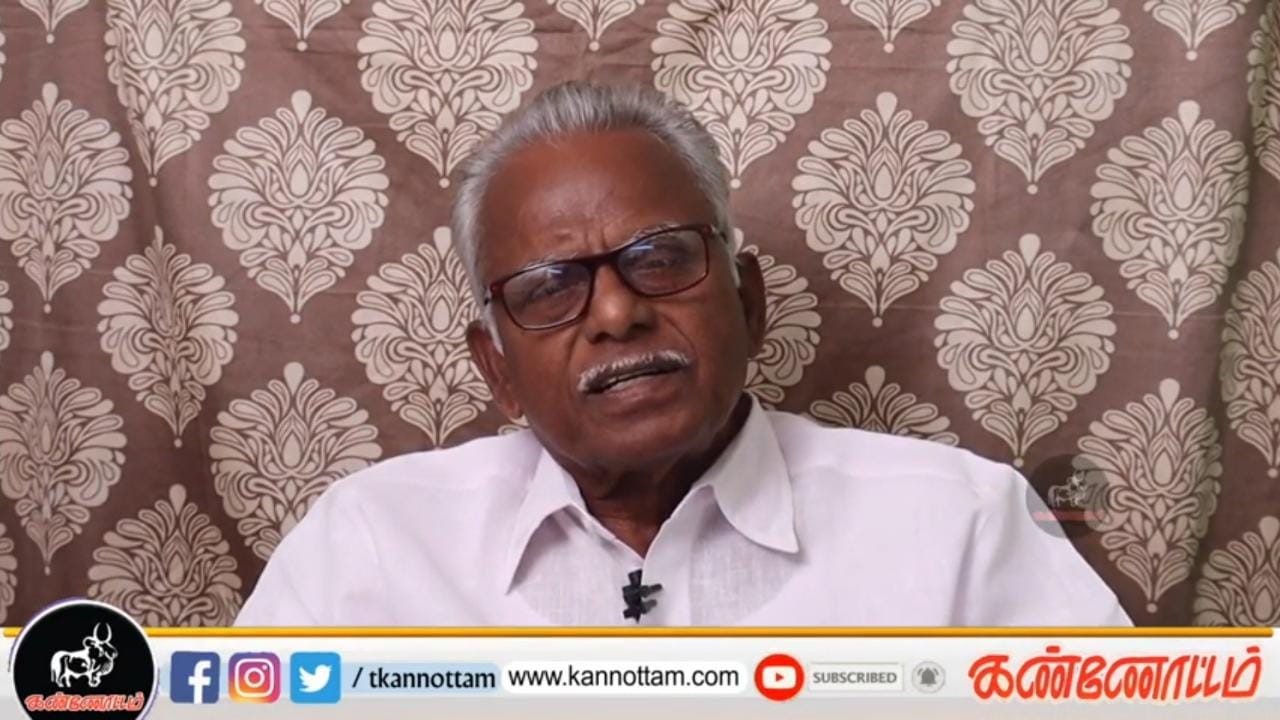
Tamil National Movement, since the last decades, has been seeking self-determination in Tamil Nadu. Without mincing words, TNM president Maniarasan speaking exclusively to the World Sikh News pointed out that, “Tamils are political orphans without a nation. We have no choice but to become a sovereign nation. We need a people’s movement for our homeland. We are enslaved in Tamizhnaadu but do not realise it. The electoral process has undermined our sovereignty and proved useless in the deliverance of civil and political rights.”
Exhorting aggressive participation by Tamils in a mass political struggle, Maniarasan who edits the Tamil National Monthly magazine Thamizh Thesiya Thamizhar Kannottam urged, “We need peaceful, weaponless Prabhakarans. Become one and do not seek only in others.”
“We need peaceful, weaponless Prabhakarans. Become one and do not seek only in others.”
Taking a long term view, the UNHRC resolution states that “Emphasizing the importance of a comprehensive approach to dealing with the past, incorporating judicial and non-judicial measures, to ensure accountability, to serve justice, to provide remedies to victims, to avoid the recurrence of violations of human rights and to promote healing and reconciliation.”

Tamil nationalism needs a determined peaceful struggle. Tamil Diaspora needs to be more proactive given the proclivity of nations to base their foreign policy, especially relating to human rights, on their own human rights observance, economic and political interests. There is an urgent need to align with the people at large and build bridges with natural allies based on mutual interests and concerns, including human rights compliance.
 Print
Print

 120
120

